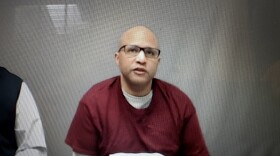Susan Ingram was confused when an automated prompt told her she had just 20 seconds to talk with her fiancé, John, a prisoner at the Joseph Harp Correctional Center in Lexington.
She had recently loaded $10 onto her Securus account, enough to pay for at least seven 20-minute calls at the six-cent per minute rate the Oklahoma Department of Corrections agreed to in February. This was just her fourth call of the Labor Day weekend, made on the evening of Sept. 1.
“Sure enough, I looked at the account, and the previous call we had done cost more than double,” she said. “I was like, what the heck.”

With minimal public notice, the Oklahoma Department of Corrections and Securus Technologies agreed to an amended contract on Aug. 29 that raised the cost of phone calls from state prisons from 6 to 14 cents per minute. The rate hike was allowed thanks to a June 30 order from the FCC delaying new rules intended to make phone and video calls from correctional facilities more affordable.
Commission payments to the Department of Corrections increase significantly in the new deal.
The agency is set to receive $312,500 per month, or $3.75 million annually, in site access fees from Securus. The Dallas-based prison communications company is also giving the agency $2.2 million worth of in-kind security technology, including call monitoring software, body scanning devices and access to its digital mail center. The previous contract, honored from late February through Aug. 31, paid the state a $580,000 annual commission from state-issued tablet revenue but no payment for phone calls.
High prison phone call rates have long drawn the ire of criminal justice reform advocates, who argue excessive costs unduly burden family members and hurt reintegration efforts. As public pressure mounted, Congress passed the Martha Wright-Reed Just and Reasonable Communications Act in January 2023, which gave the FCC more regulatory authority over intrastate phone calls from prisons and jails.
As required by the legislation, the FCC in July 2024 added regulations to prison communications, including capping the cost of phone calls from large correctional facilities at six cents per minute. However, on June 30, the agency announced a two-year pause on the rate caps, citing unintended consequences. A group of Republican state attorneys general, not including Oklahoma Attorney General Gentner Drummond, sued the FCC in October over the rate cap, arguing it was depriving them of revenue that supports security operations.
“Today’s waiver not only supports the law enforcement community’s efforts to build systems that work for our prisons and jails, but addresses implementation challenges of the 2024 Order—in particular, dropping the rate caps too low to cover the required safety measures and before state and local governments could secure alternative funding,” said FCC Chairman Brendan Carr, who voted in favor of the rate caps last year when he was a commissioner, in a statement.
Maureen Hunt, a Tulsa resident whose husband, Terry, is incarcerated at Joseph Harp, said she and other Oklahoma customers received only vague notice of the rate hike days before it took effect.
Securus sent Oklahoma customers an email on Aug. 29 stating that “rates may be changing” based on a recent FCC decision. However, the email did not list an amount or effective date of the rate change, which took effect on Sept. 1.

“They were so ambiguous in there,” Hunt said. “They didn’t say what they should have said, which is by the way, your rates are going back up.”
Wanda Bertram, a spokesperson for the Prison Policy Initiative, said the lack of notice for many consumers signals a lack of respect from service providers. She said a similar sudden rate hike would not be tolerated for subscriptions or streaming services on the outside.
“Over and over again, we see that incarcerated people and their loved ones are not consumers like everyone else,” Bertram said. “They are treated as people who can be exploited and basically left in the dark about the quality and the cost of the technology that they’re using.”
Securus declined to answer questions about its notification of Oklahoma consumers.
Most state prison systems have not raised rates since the FCC waiver. Phone calls in neighboring Texas, Arkansas and Missouri cost five to six cents per minute, according to Securus’ rate calculator. A handful of states, including New York, California and Minnesota, have made prison phone calls free.
Hunt said the rate increase couldn’t come at a worse time for her and Terry, who’s nearing completion of a college degree. She said she often has to call and assist with coursework research because he doesn’t have internet access.
“It’s a huge burden on the families,” she said. “They might come back and say, well it’s your loved one who’s incarcerated, they should be the ones to pay for it. That would be fine if they could afford to pay for it, but Terry works full time and makes $40 a month. He can’t even pay for a handful of phone calls with that money.”
Ingram said she’s been forced to call less since the rate hike took effect. In addition to calls, she said she also pays hundreds of dollars per month to send text messages and pay for gas and meals on visits.
“It’s frustrating when you get somebody that wants to make a buck and the state is just capitalizing on people who can’t really do anything about it,” Ingram said.
Oklahoma Watch, at oklahomawatch.org, is a nonprofit, nonpartisan news organization that covers public-policy issues facing the state.









